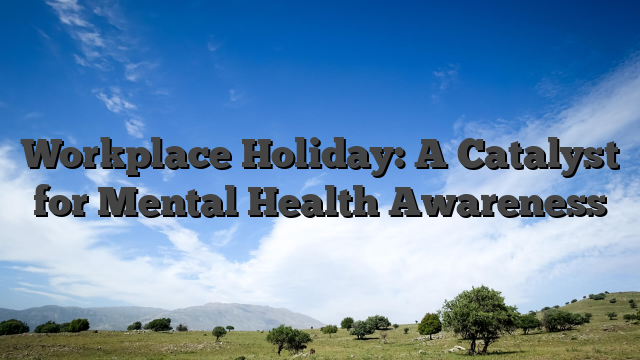A workplace holiday typically refers to a day or period when employees are granted time off from work to observe a special occasion, celebration, or public holiday. These holidays can include widely recognized events such as Christmas, New Year’s Day, Thanksgiving, or other cultural and religious observances. The purpose of workplace holidays is to allow employees to take a break, spend time with family and friends, and recharge. Office Closure contributes to employee well-being, morale, and work-life balance.
Do workplace holiday affect mental health?
Yes, workplace holidays can significantly positively impact mental health. Taking a break from work during holidays provides employees with the opportunity to relax and rejuvenate, leading to reduced stress levels. This break allows individuals to step away from the demands of the workplace, promoting mental well-being by providing a mental and emotional reset. Engaging in activities outside of work and spending quality time with loved ones during holidays contribute to a sense of happiness and fulfillment.
Exploring the Benefits of a Workplace Holiday?
Overwhelmed by workload Consider a workplace holiday for much-needed relief. If stress persists, reach out to a “Psychologist near me” for healing support.
- Rest and Rejuvenation: Office Closure provides employees with a valuable break, allowing them to rest and recharge both physically and mentally.
- Stress Reduction: Time away from work can contribute to stress reduction, promoting better mental health and overall well-being.
- Improved Morale: Knowing that employers value and acknowledge holidays boost employee morale, fostering a positive work environment.
- Enhanced Productivity: Rested and rejuvenated employees are more likely to return to work with increased focus and productivity.
- Quality Family Time: Holidays provide an opportunity for employees to spend quality time with their families, strengthening personal relationships.
- Cultural and Religious Observance: Company Break allow employees to observe and celebrate cultural or religious events that hold personal significance.
- Increased Job Satisfaction: Recognizing holidays demonstrates an employer’s commitment to employee satisfaction and work-life balance.
- Community Engagement: Some holidays encourage community engagement and volunteerism, fostering a sense of social responsibility among employees.
- Creativity and Innovation: A break from the routine can stimulate creativity and innovation, bringing fresh perspectives to the workplace.
- Enhanced Employee Retention: Employers who prioritize and offer holidays as part of the benefits package may experience increased employee loyalty and retention.
- Health and Well-being: Regular breaks, including holidays, contribute to better physical and mental health, reducing the risk of burnout.
Workload taking a toll on your relationship Explore “Counseling for relationships” and seek the support you need to navigate challenges together.
Are workplace holiday good effect on employee mental health?
Yes, workplace holidays can have positive effects on employee mental health in several ways:
- Reduced stress and burnout: A break from the usual routine and workload can help employees unwind, recharge, and come back feeling refreshed.
- Boosted mood and morale: Festive activities and celebrations can create a more positive and fun atmosphere, which can lift employees’ spirits and increase their happiness.
- Stronger social connections: Holiday events provide opportunities for colleagues to bond and connect outside of work, fostering teamwork and a sense of belonging.
- Improved appreciation and recognition: Companies that organize holiday events show they care about their employees’ well-being, which can boost employee engagement and loyalty.
- Increased gratitude: Focusing on celebrations and giving back during the holidays can cultivate a sense of gratitude among employees, which is linked to better mental health overall.
However, it’s important to remember that not all workplace holidays have the same effect.
The Impact of a Stress-Free Workplace Holiday?
Experiencing a stress-free workplace holiday can have numerous positive effects on both individuals and the overall work environment.
- Restored Energy: Employees return to work with restored energy and vigor after a stress-free holiday.
- Increased Productivity: Reduced stress levels contribute to improved focus and productivity.
- Positive Mental Health: Stress-free holidays positively impact mental well-being, reducing feelings of anxiety and promoting a positive outlook.
- Elevated Morale: Employees experience a boost in morale, contributing to a more positive and collaborative work atmosphere.
- Enhanced Physical Well-being: Lower stress correlates with better physical health, as employees have the opportunity to engage in activities that promote wellness.
- Strengthened Relationships: Stress-free holidays provide time for employees to strengthen personal relationships, fostering a sense of connection.
- Greater Job Satisfaction: Employees who enjoy stress-free holidays are more likely to feel satisfied with their jobs and workplace.
- Fostered Creativity: A relaxed mind encourages creative thinking and innovation, leading to fresh perspectives and ideas.
- Reduced Absenteeism: Stress-free holidays contribute to lower rates of absenteeism, as employees return to work feeling refreshed and motivated.
- Positive Company Culture: Prioritizing stress-free holidays contributes to a positive company culture, attracting and retaining talented individuals.
It’s important to note that the impact of a stress-free workplace holiday may vary depending on individual circumstances and the specific organizational culture.
10 Ways to Enjoy a Stress-Free Workplace Holiday?
Certainly! Here are to enjoy a stress-free workplace holiday:
- Plan Ahead: Complete pending tasks before your holiday starts to minimize looming deadlines and last-minute stress.
- Communication Boundaries: Clearly communicate to colleagues and clients about your time off, setting boundaries for work-related communication.
- Unplug: Disconnect from work emails and messages during your holiday to fully detach and immerse yourself in the break.
- Self-Care Routine: Prioritize self-care by indulging in activities that bring you joy and relaxation, whether it’s reading, walking, or enjoying a hobby.
- Quality Time: Spend quality time with loved ones, focusing on creating meaningful memories without the distractions of work.
- Mindful Breaks: Practice mindfulness by consciously avoiding thoughts about work during your holiday. Stay present in the moment.
- Try Something New: Inject novelty into your break by trying new activities or exploring places you haven’t visited before.
- Delegate Responsibly: If possible, delegate tasks and responsibilities before your holiday, ensuring a smoother transition and less stress upon your return.
- Reflect and Recharge: Take time for personal reflection, recharge your energy, and gain perspective on your life and work.
In conclusion, taking a stress-free workplace holiday is more than just time off—it’s a vital opportunity to recharge, relax, and invest in your overall well-being.




